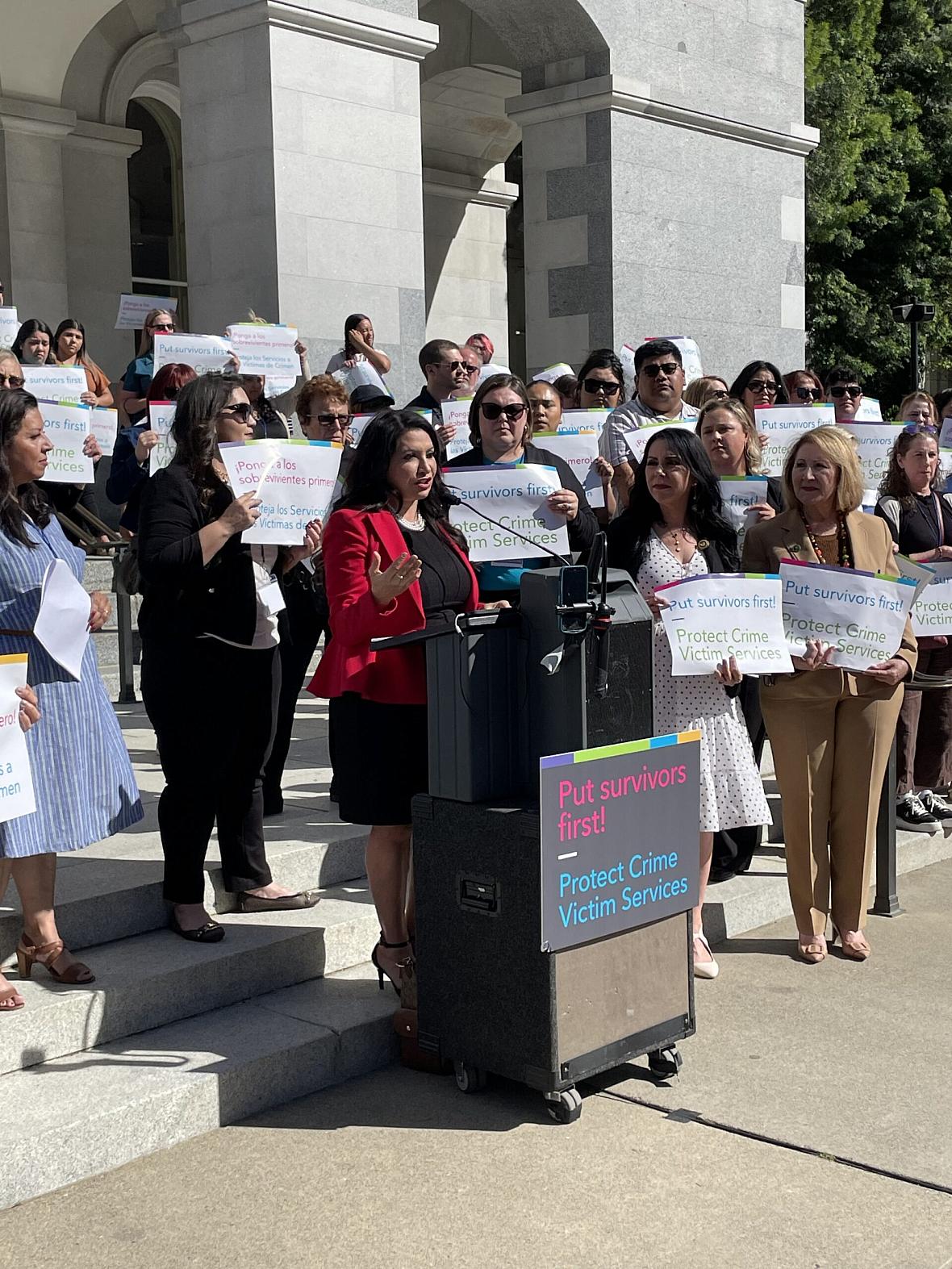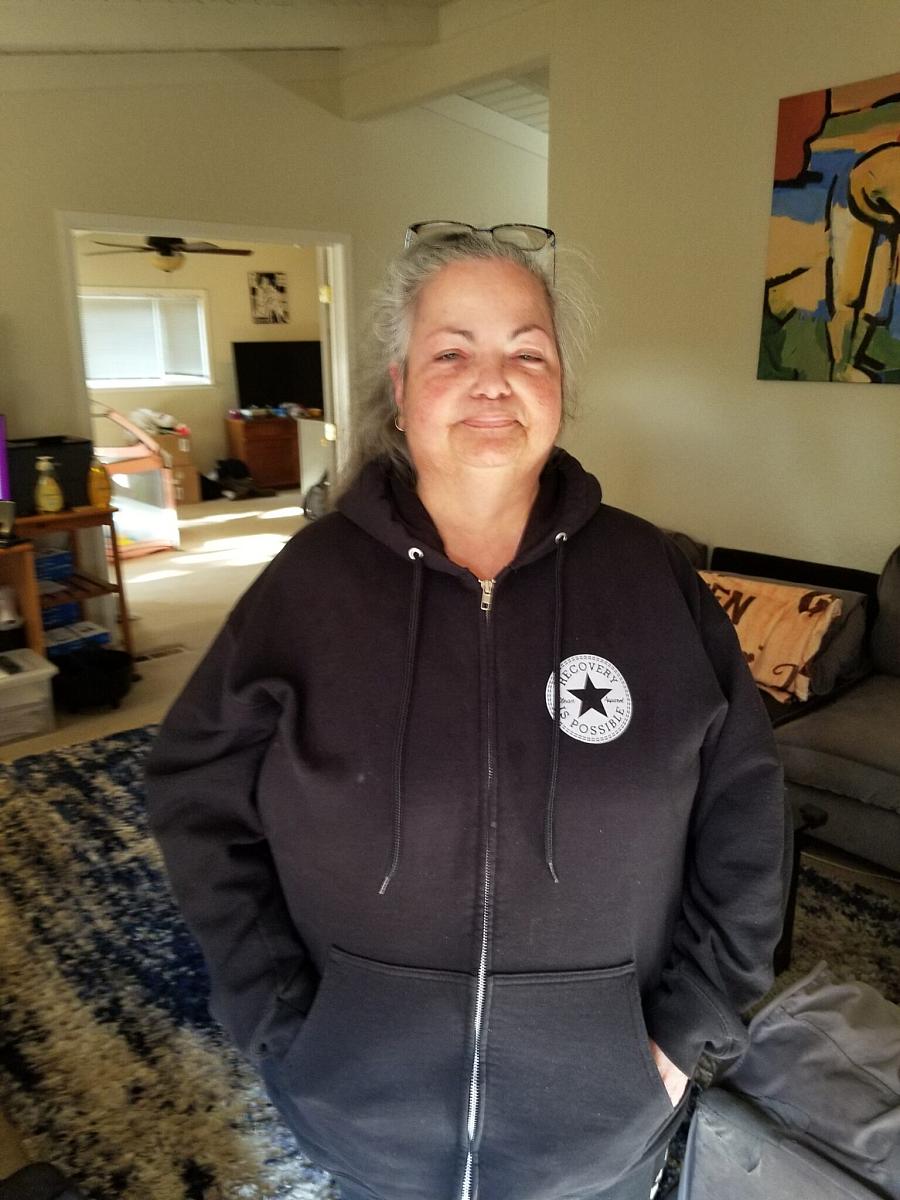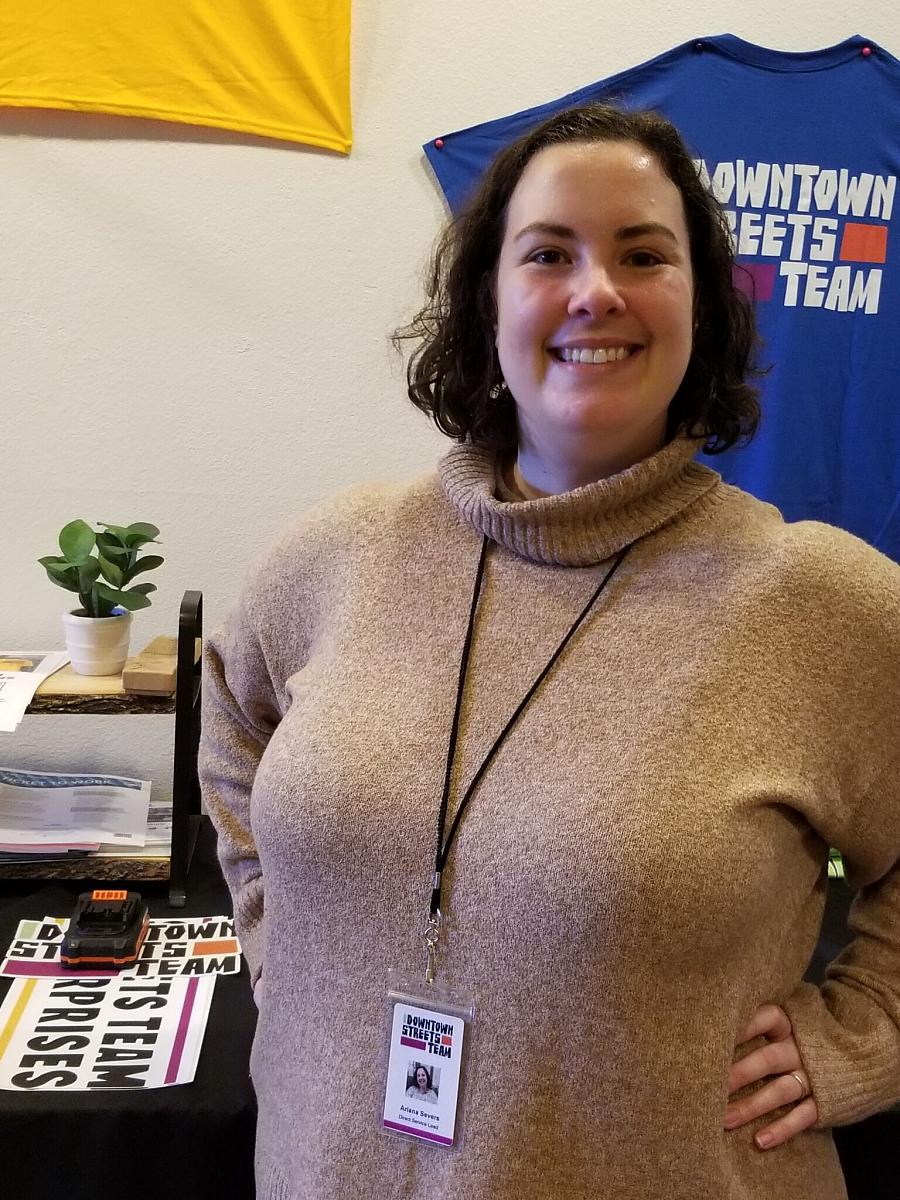Recent Policy Reforms May Help California Domestic Violence Survivors Stay Housed
The story was originally published by San Francisco Public Press with support from our 2023 Domestic Violence Impact Fund.

State Sen. Susan Rubio, D-Baldwin Park, joined women’s and children’s advocates at the state Capitol April 30 to urge California to address federal funding shortfalls for crime victim services. Rally organizers included ValorUS and the California Partnership to End Domestic Violence, as well as Assembly members Blanca Rubio, D-Baldwin Park, and Eloise Gómez Reyes, D-San Bernardino.
Courtesy ValorUS
Jesica Giannola, a domestic violence survivor and women’s rights activist who lives in Chico, said a friend complained that she could not get landlords to consider her housing application after disclosing her bad credit history.
The friend, a mother of two in her 40s, had suffered from longstanding intimate partner abuse, later to lose her home in the 2018 fire that destroyed most of the small mountain town of Paradise, Calif.
Now living in government-funded transitional housing, the woman has been looking — in vain, so far — for a long-term residence. Her federally subsidized housing voucher is to expire in June.
Victims’ advocates worry that domestic violence survivors can end up homeless, and sometimes shun emergency the shelter system and instead brave days and nights outdoors. “Many women survivors prefer to stay in their car rather than in a shelter,” Giannola said. “They feel safer.”
But many survivors will be helped by a recent California reform prohibiting landlords of apartments that accept government rent subsidies from using credit history in the application process, so long as prospective tenants can offer alternative evidence of their ability to pay. While the change does not focus on domestic violence victims, abused women could be among the greatest beneficiaries.
As of last January, California landlords accepting Section 8 vouchers or other housing subsidies may not use credit reports when screening tenant applications. A law authored by state Sen. Susan Talamantes Eggman, a Democrat from Stockton, allows applicants instead to provide pay stubs or bank records as evidence that they can pay their portion of the monthly rent.
In proposing her bill, SB 267, before the Senate Judiciary Committee, Eggman said research shows that credit scores are unreliable tests of whether tenants can pay rent in time and in full. A couple of outstanding medical bills, for instance, can lower credit scores.
Supporters say the reform is a lifeline for those who leave partners while having poor credit or no money because of financial abuse. That financial instability can cascade on all parts of their lives and makes it hard to get back on their feet.
Giannola shared her own history as a domestic violence survivor at two webinars this year, organized by leaders of a UCSF Benioff Homelessness and Housing Initiative statewide study.

Jesica Giannola says providing survivors with safe housing can break the cycle of violence.
Courtesy Jesica Giannola
The researchers surveyed more than 3,200 adults experiencing homelessness across California, and did in-depth interviews with 365 people for one year, concluding in November 2022.
The study, co-funded by the Blue Shield of California Foundation and the California Health Care Foundation, found that nearly two-thirds of respondents struggled to find housing because of poor credit or eviction history, problems often directly resulting from violence in the home.
It found that one in five unhoused women fled home to escape violence and escalating abuse by an intimate partner. More than 40% of them said they continued to experience violence after leaving their homes.
The shortage of domestic violence shelters leaves women exposed to additional violence in homeless encampments, the study found.
“That system is completely overwhelmed and people are winding up in encampments,” said Dr. Margot Kushel, the initiative’s director and co-author of the report. “There are only so many places you can hide when you are vulnerable.”
Outside and at risk
Angela Garcia, 32, said that since she and her drug-addicted ex-husband separated, she has been couch surfing with friends in the East Bay. For a while, she pitched a tent along the railway tracks near the Hayward Public Library, surrounded by other unhoused people and vulnerable to theft. “I would sometimes get back to my tent after a bathroom break only to find my clothes gone,” she said.
Chris Richardson is chief program officer of Downtown Streets Team, a 15-year-old statewide nonprofit organization many of whose workers are themselves unhoused or at risk of homelessness. The organization provides supportive services and resources to people living outdoors or in temporary shelter. Many team members are low-income people who have experienced intimate partner violence.
Team members who have experienced such violence are reticent to come forward. “They will talk about getting arrested, about prison time,” Richardson said, “but not about their domestic abuse because there is a lot of stigma and shame around it.”
Dr. Anita Hargave, an assistant professor of medicine at UCSF, who contributed to the report, said intimate partner violence could affect people across many economic strata, but especially the poor. In the study, 73% of participants said relatively modest amounts of financial support — even monthly subsidies as low as $300 to $500 — would have kept them housed for at least two years. Even more respondents, 83%, said a lump sum of $5,000 to $10,000 would have saved them.
Some survivors attest to the security that would come with a little financial independence.
“I was terrified to survive on my own,” said Susan Lenzi, 61, a San Anselmo resident, who recalled having struggled with drug addiction and several abusive men.
Without a place of her own, Lenzi’s life spiraled downward until Marin County officials threatened to take away her 6-year-old daughter, Natasha, who was raped by one of Lenzi’s boyfriends.
Lenzi, then 23, decided to leave the girl with her own parents in Mill Valley, checked herself into a rehab facility and then into a domestic violence shelter. The shelter staff helped her find transitional housing, a key to her recovery from addiction.
Supportive services gap
The UCSF report made several policy recommendations including more domestic violence shelters, better coordination of shelter and social service intake systems and access to permanent housing.
But women’s and children’s rights advocates worry that California might not make much progress toward those goals anytime soon. The state is likely to face a huge budget shortfall in the coming fiscal year, estimated at $38 billion by Gov. Gavin Newsom, and $72 billion by the Legislative Analyst’s Office.

Domestic violence survivor Susan Lenzi at the Section 8 rental housing of her daughter in San Anselmo.
Viji Sundaram / San Francisco Public Press
The state also faces a 45% reduction of federal support through the Victims of Crime Act, which funds service providers that work with domestic violence, sexual assault and child abuse cases. In California, the Office of Emergency Services distributes the money to about 400 programs.
The California State Association of Counties says it expects Congress to cap the grant program nationally at $1.2 billion in the fiscal year beginning Oct. 1, a reduction of about 37% from current-year funding. The federal grant is the primary funding source for crime victim services in all 50 states and six U.S. territories. It is drawn from fines and penalties levied on people and corporations convicted of federal crimes. No taxpayer dollars are used.
According to a March 12 statement from the National District Attorneys Association, without immediate congressional intervention, critical service providers face severe cuts, or even closure.
For California, the reduction is nearly $154 million, said Grace Glaser, policy manager in the Sacramento office at ValorUS, a nonprofit organization that offers support services for crime victims nationwide. “We need $262 million to sustain current programs,” she said.
Marissa Seko, family violence intervention unit manager at the Oakland-based Family Violence Law Center said her organization uses “some of those federal funds to stabilize the situation of domestic violence survivors to help them relocate to a safe place.” She added: “That money can be critical to prevent a survivor from becoming unhoused.”
ValorUS, the California Partnership to End Domestic Violence and seven other women’s and children’s rights groups are placing their hopes for continued funding in the Crime Victim Service Stabilization Act, a bill co-authored by Assembly members Eloise Gómez Reyes, D-Colton, and Jesse Gabriel, D-Encino. Last month, the Assembly Public Safety Committee passed the bill, AB 1956, unanimously.
The bill is the state’s equivalent of the federal Victims of Crime Act. It would require the state to fill funding gaps in essential crime victim services when federal funding decreases more than 10% in any year. The support groups are asking the state for $200 million.
“California stands by victims of crimes,” Reyes said in a statement, “and we are committed to ensuring the safety and well-being of these survivors who deserve consistent and reliable access to healing services.”
Other reforms
In addition to Eggman’s bill banning landlords from using a person’s credit history as part of the application process for housing, at least two other state laws passed last year could provide reprieve for domestic violence survivors in accessing affordable housing.
The Safe and Inclusive Housing Act, Assembly Bill 1418,authored by Tina McKinnor, D-Inglewood, made California the first state to ban so-called crime-free housing ordinances and nuisance laws that some municipalities adopted in the 1990s, allowing landlords to exclude or evict tenants with criminal histories. Because even a 911 call could be considered an indicator of criminal activity, “the ordinances made it more difficult for victims of domestic violence to call law officials,” said Max Griswold, a researcher at RAND, a policy think tank.
Another new measure that favors domestic violence survivors is Assembly Bill 12, authored by Matt Haney, a Democrat from San Francisco. It caps security deposits at one month’s rent, regardless of whether a unit is furnished. In the past, landlords were allowed to charge up to three months’ rent. The law kicks in July 1.
Local reforms also could help. San Francisco voters in March approved a $300 million bond measure to increase the supply of affordable housing. Of that, $30 million is targeted to domestic violence survivors.
Deciding to give back
East Bay resident Ariana Severs, 30, fled her ex-husband after he “beat me to a pulp” within a year after their marriage. He then threatened to buy a gun to shoot her.

Domestic violence survivor Ariana Severs believes that her work with the unhoused is helping her heal.
Viji Sundaram / San Francisco Public Press
Remarried and with two children, Severs works as a direct-service lead with the Downtown Streets Team. The job, she says, is helping her to heal.
Natasha, Lenzi’s daughter, is now a stay-at-home mom looking for ways to help others. She said she might go back to counseling at women’s shelters once her children are grown. She briefly worked at the one in San Rafael to which she had fled in her late 20s.
“The two years I worked at the shelter were so empowering,” she said. “I want to tell my story to help other women.”
When Giannola left her abuser and took her two young children, then ages 1 and 4, with her, her credit history was messed up. She was forced to file for bankruptcy. She knew what it was like to be unhoused, having lived most of her childhood and early teens in trailers, cars and tents with her parents and four siblings. “That’s all we could afford,” she said.
She is remarried and has two more children, one adopted. Until recently, she worked as a case manager for a nonprofit organization in Chico that helps Paradise fire refugees get housing. She sees her advocacy for the homeless and domestic violence survivors as intimately connected.
“Providing survivors with safe housing,” she said, “breaks the cycle of violence.”

